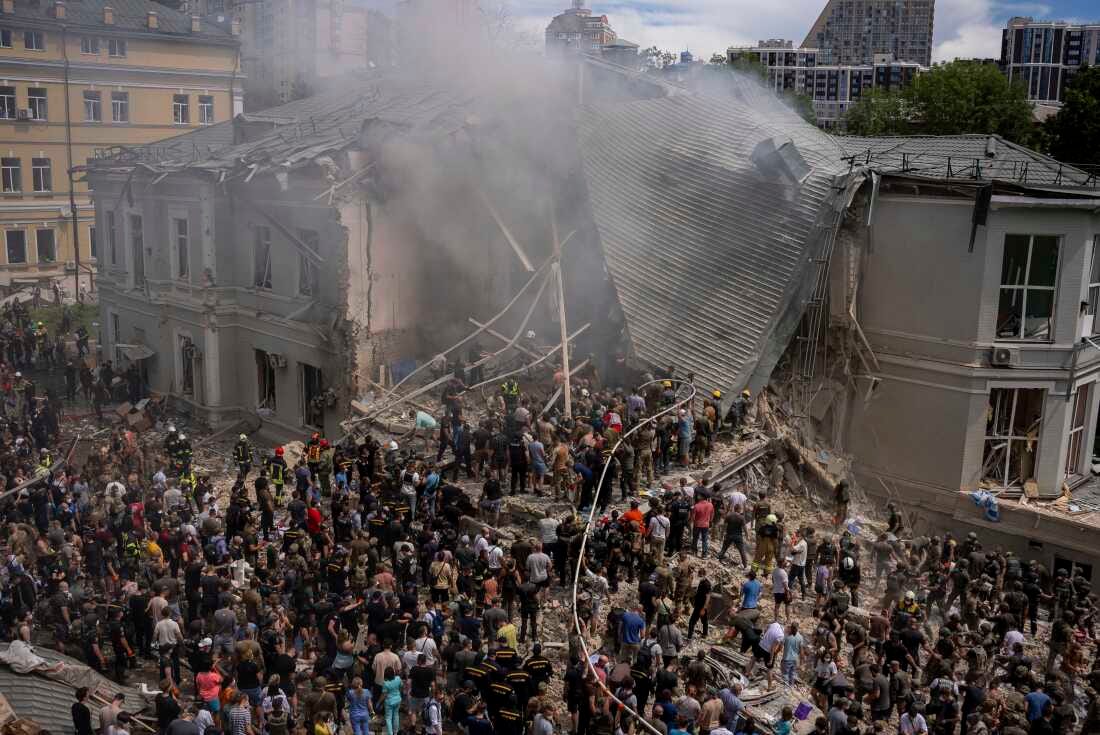On July 9, a Russian missile barrage destroyed Ukraine’s largest children’s hospital. This act is almost too inhuman to be described politically: Adults from one place murdered sick children from another place. It’s an indescribably evil act.

Let’s assume—as it seems safe to do—that the Russian military personnel responsible for the missile attack knew what they were aiming at and knew it had no useful military purpose and that targeting it was, therefore, a violation of the laws of war. They committed a war crime.
The UN Security Council passed a resolution condemning the strike. In the United States and Western Europe, students took to college campuses and the streets of large cities to wave the Ukrainian flag. Russia’s major allies called for restraint and prompt investigations. Resolutions were introduced in Iran’s Majlis and the Central Committee of the Chinese Communist Party calling for military aid to Russia to be curtailed.
Of course, none of that reaction was real. There was a meeting of the UNSC—chaired by Russia. No protests rocked the West, and Russia’s allies (such as they are) seem to have no misgivings whatsoever about its conduct of the war, at least not on humanitarian grounds. The contrast between the responses to Israeli war crimes—actual and fictitious—and Russia’s, or indeed between Russia’s war crimes in 2022 and 2024, exposes a problem with “war crimes” as commonly understood.
War crimes are bad. That’s not really up for debate. But our system of thinking about, addressing, preventing, and punishing war crimes is also wrong. War crimes are evil in the normative sense that they are morally wrong—indeed, participating in war crimes is up there on the list of the worst things a person can do. Our system for dealing with them is terrible in the sense of not working very well—and it’s therefore also morally deficient.
The array of deficiencies of our current war crimes system can be sorted into three categories: political, strategic, and moral. (There is a fourth category of judicial/legal issues with war crimes, such as those that arose when the prosecutor of the International Criminal Court sought arrest warrants against Israeli and Hamas officials, but unlike the political, strategic, and moral problems, those judicial problems are amenable to judicial solutions.)
Politics: What is the difference between a murder in Odessa, Texas, and a murder by the Russian military of civilians in Odessa, Ukraine? In Texas, the city of Odessa has a police department, the county of Ector has a sheriff, the state has a Highway Patrol—and just in case there’s a federal crime implicated in the murder, the federal government has a host of law enforcement agencies, too. There are courts at every level. There is, in Max Weber’s classic phrase, a state that maintains a monopoly on the legitimate use of violence. Those law enforcement and judicial systems can be expected, with some degree of reliability or another, to investigate, punish, and deter crime.
There is no monopoly on the legitimate use of violence in Ukraine. Neither Russia nor Ukraine is sufficiently strong to deter the other from using violence, and they’ve been using organized violence against each other since 2014. (In case it’s not clear, Russia’s use of violence is illegitimate and aggressive; Ukraine’s is legitimate and defensive.)
When Russia murders Ukrainian civilians, there is no international police force, no court, and no prosecutor that can compel it—collectively or as represented by its political and military officials—to face justice. The International Court of Justice and the International Criminal Court are intended to act as a sort of international police for certain crimes, but they don’t have any force.
In Moscow, Idaho, the police can get a warrant to break into someone’s house and arrest him. But no one from the ICJ or ICC is going to break into the Kremlin in Moscow, Russia, to arrest Putin.
The only way to even have a shot at justice for the perpetrators of war crimes is if the people who detest war crimes win the war. The Nuremberg trials didn’t happen because the Nazis were evil; they happened because the Allies won.
Strategy: For there to be justice for war crimes, there has to be a monopoly on violence. That means the capability of one side to continue organized violence has to be eliminated. In other words, one side—the anti-war crimes side—has to be victorious.
The problem, as has become all too obvious in recent years, is that the side that engages in war crimes puts itself at an advantage. Hamas shields itself behind and under the civilian population of Gaza, in hospitals, schools, and mosques, and behind civilian hostages. It hoards food, water, and fuel in its tunnels while the civilians above die of heat, hunger, and thirst. It breaks the laws of war, knowing full well that its enemy will try to respect them most of the time. If Hamas didn’t think that Israel would try to respect the laws of war, why would it go to such great lengths to use human shields and protected buildings?
If Israel were to decide to ignore the laws of war completely, eradicating Hamas would become much easier. Ground forces would be almost unnecessary. The entire campaign could be conducted from the air. (The presence of Israeli and international hostages in Gaza would complicate an air-only campaign, but not as much as trying to abide by the laws of war does.)
To give another example, Russia benefits from attacking Ukraine’s energy infrastructure by forcing it to spread its limited air defenses over a country the size of Texas rather than focusing them on the front lines. Russia, in theory, would be more vulnerable than Ukraine to attacks targeted at civilian infrastructure because its population is dispersed over an even larger area. Still, the Ukrainians have focused on military targets.
If all sides refrain from war crimes, then everybody wins. If everyone commits war crimes, then no one gets an advantage. But the “safer” bet is always to commit war crimes because it comes with the possibility of an advantage.
Of course, in the real world, it’s never as simple as that. All armies commit crimes of some kind or another—it’s just a question of frequency and severity. Some armies punish war crimes by their own combatants. Some don’t. The differences can be extreme.
Ethics: There’s a difference, however, between an army that commits war crimes, fails to prosecute and punish them, and even implicitly encourages them and an army waging an unjust war. Writing about the ICC’s warrant for Israeli officials, Brian Stewart observed that “If nations are frustrated in their attempts to wage just wars, there will be only unjust wars. The barbarians will inherit the earth.” An army can be poorly disciplined, disorganized, poorly trained, poorly led, and fighting for a noble cause.
Israel’s war against Hamas has featured pretty clear cases of war crimes—and many more unclear cases of possible war crimes. But it is undeniably a just war, waged in self-defense after an unprovoked attack and with the goal, among others, of punishing one of the most vicious violations of the laws of war so far this century. Ukraine, likewise, has been accused of violating the laws of war, but its cause is indisputably noble.
If the ICC does obtain its arrest warrants for Bibi Netanyahu and Yahya Sinwar, which is more likely to be carried out? Which leader is more likely to visit a country that is party to the ICC’s treaty? Or, to put it another way, which leader would be more constrained by being unable to visit those countries?
Vladimir Putin already has an ICC warrant out for his arrest. But he seems perfectly comfortable to live out his days in Russia—with the occasional trip to China or North Korea. What does he care about an ICC arrest warrant? By contrast, such a warrant would be a catastrophe for Zelensky.
Without a universal enforcement mechanism, the laws only apply to those who wish to follow them—those who willingly put themselves at a military disadvantage for the sake of humanity.
That war crimes are bad is beyond dispute. But it doesn’t make sense to have a system that only criminalizes people who take war crimes seriously.
A further complication is that moral sentiments aren’t purely rational. The war between Israel and Hamas has aroused sharp opinions around the Western world, to say the least. Russia’s war against Ukraine did, too, for a time, though less and less as time goes on. Almost no one says a word about the ongoing Syrian Civil War, much less the civil war in Myanmar. For some reason, the strip of land between the Mediterranean and the Jordan captivates the West like no other region, adding yet more incoherence to the punishment of war crimes.
Douglas MacArthur was far from the ethical model of a modern soldier. But he did, in one of his famous utterances, give the best starting point for how war crimes should be addressed: “There is no substitute for victory.”
Benn Parker is Senior Editor, at The Bulwark



